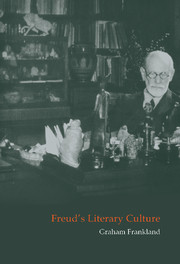Book contents
- Frontmatter
- Contents
- Preface
- Acknowledgements
- Introduction
- Chapter One The unconscious of psychoanalysis: Freud's literary allusions
- Chapter Two A sublime ambivalence: Freud as literary critic
- Chapter Three The literary-critical paradigm: sources of Freud's hermeneutic
- Chapter Four The frustrated Dichter: literary qualities of Freud's text
- Conclusion
- Notes
- Bibliography
- Index
Chapter Four - The frustrated Dichter: literary qualities of Freud's text
Published online by Cambridge University Press: 22 September 2009
- Frontmatter
- Contents
- Preface
- Acknowledgements
- Introduction
- Chapter One The unconscious of psychoanalysis: Freud's literary allusions
- Chapter Two A sublime ambivalence: Freud as literary critic
- Chapter Three The literary-critical paradigm: sources of Freud's hermeneutic
- Chapter Four The frustrated Dichter: literary qualities of Freud's text
- Conclusion
- Notes
- Bibliography
- Index
Summary
FREUD AS STYLIST: ARTFUL REVELATIONS
In chapter 3 certain confusions arose regarding Freud's precise role in his treatment of various ‘texts’. In his Leonardo study, for example, he is patently no mere ‘literary critic’ analysing the text of a childhood memory; he is, rather, the creator of a wholly new kind of text. It is tempting to expand the scope of this insight to embrace not only Freud's therapeutic constructions and dream interpretations, but also his more abstract theoretical works. Such a radical reappraisal of Freud – as a writer, in a literary sense of the term – has been attempted by a few critics, such as Stanley Hyman and Patrick Mahony, and in this chapter I shall draw on their conclusions. Principally, though, I intend to follow my own path, starting from the most superficially ‘writerly’ aspects of Freud's texts and developing towards a fundamental reassessment of the very status of his oeuvre. The chapter will cover three main areas. Firstly, I shall examine Freud as a stylist, concentrating mainly on his expository skills and his use of imagery. Next, I shall consider him as a creator, both in therapy and theory, of ‘fictional’ narratives. Finally, I shall view his work from the most radically literary perspective of all: as the obliquely autobiographical product of a – frustrated or suppressed – would-be Dichter.
- Type
- Chapter
- Information
- Freud's Literary Culture , pp. 162 - 233Publisher: Cambridge University PressPrint publication year: 2000



